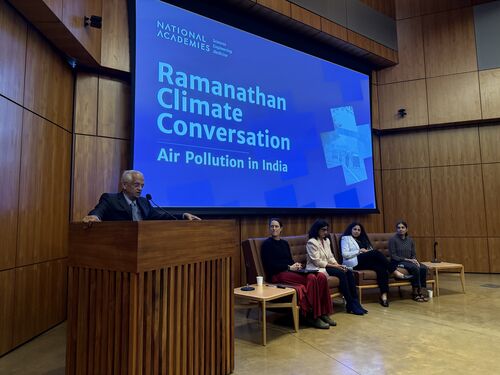Ocean Studies Board Makes Waves at the COP28 Ocean Pavilion
Program News
By Paige Nankey
Last update January 31, 2024
Despite the ocean’s crucial role in regulating the Earth’s climate, climate discussions have historically focused more on atmospheric and land-based climate impacts and strategies than on those in the ocean. But the tide is turning with the growing recognition that ocean health is rapidly declining as it continues to absorb excess CO2 and heat while warming to record temperatures. At the same time this concern comes with interest in harnessing the power of the ocean in potential carbon sequestration strategies, developing new sources of renewable energy, and cultivating sustainable food sources.
The Ocean Pavilion was established in 2022 to serve as a dynamic platform to highlight the importance of our world’s oceans and foster collaboration during the annual Conference of Parties (COP). The pavilion offers a welcoming space for ocean stewards and climate champions to share information and engage with other scientists and policymakers worldwide. In its second year at COP28, held in December 2023 in Dubai, United Arab Emirates, the Ocean Pavilion provided an engaging platform to raise awareness on solutions and actions to address the global climate issue.
The Ocean Studies Board (OSB) sent Senior Program Officer Kelly Oskvig to represent and showcase the ocean-related work of the National Academies at the Ocean Pavilion.
“The Pavilion was about four times bigger than last year, with an immersive theater, meeting rooms, reception area, and large amphitheater,” Oskvig said. “This provided an inviting and comfortable space that was full of people all day, every day.”
During the conference, various themed sessions delved into discussions on the current state of the global ocean. Of particular interest was a session focused on ocean-based carbon dioxide removal.
“We had a strong turnout for this event and the Q&A session resulted in some interesting ideas for the Academies (and others) to consider in terms of future work in this space,” Oskvig said. “I was particularly appreciative of praise for our 2022 study [A Research Strategy for Ocean-based Carbon Dioxide Removal and Sequestration] and support for thinking about new ways the National Academies can continue to be a valuable resource to the ocean-climate community.”
Additionally, a session focusing on marine heatwaves emerged as another favorite among attendees. The session commenced with introductory remarks on the urgent need to protect our warming oceans.
“Our speakers were fantastic, and there was some valuable match making in terms of connecting scientists from island nations to global data sets (like Argo) that can help them understand what is going on in their nation’s waters,” recounted Oskvig.
All in all, this year’s pavilion themes of “A Changing Ocean,” “Climate Consequences,” and “Future Oceans” reiterated the importance of the critical role oceans play in the future of the Earth’s climate.
“This year’s themes related 100% to Ocean Studies Board and National Academies work,” Oskvig said “Under each theme there are numerous topics relevant to projects from the last few years, projects in progress, and topics with the potential to become future work.”
More like this
Discover
Events
Right Now & Next Up
Stay in the loop with can’t-miss sessions, live events, and activities happening over the next two days.
NAS Building Guided Tours Available!
Participate in a one-hour guided tour of the historic National Academy of Sciences building, highlighting its distinctive architecture, renowned artwork, and the intersection of art, science, and culture.



